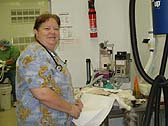Finding displaced and abandoned dogs after Katrina wasn't difficult. Offers of food can usually persuade dogs to trust rescuers. Cats presented a different challenge. Frightened cats hide from strangers and noise, sometimes in places so inaccessible that no amount of searching can be successful. Feral cats compound the problem, because they tend to be aggressive even after capture.
The U.S. is also dealing with an animal population explosion, with more than 5,000 puppies and kittens born every day. Animal rescue groups like the ASPCA don't believe that feral removal programs—a euphemism for killing—are a solution to the problem, but spaying, neutering and education are.
The Big Fix Rig is a 53-foot mobile surgical trailer staffed with vets and vet techs from Mississippi, owned by the Humane Alliance of North Carolina and made possible by a grant from a six corporations and animal- rescue charities. As they travel, they work with shelters, humane organizations, and hurricane-affected and low-income pet owners, providing low-cost spay and neuter services for cats. They also work with managers of feral colonies providing humane traps. Feral cats are returned to their colonies after surgery.
The Big Fix Rig can perform up to 60 surgeries a day with two vets. Oxford vet Dr. Robert Guy, a permanent staffer with the Rig, and Jackson vet Dr. Dana Ford were on duty last Thursday. While in Jackson, the Gray-Daniels Auto Family is providing the highly visible parking space for the rig at the corner of Highway 80 and Crossroads Boulevard. After the holidays, the Rig will provide services in Brandon from Jan. 2 through Jan. 6, when they move to Cleveland and then Hernando.
The JFP talked with Dr. Robert Guy and Elizabeth Speed, the Big Fix's project coordinator about what they do and why they do it.
JFP: Why only cats?
Guy: "When you put three or four dogs together, they start acting like dogs and they get into trouble, just like turning teenage boys loose. Plus, animal control and rescue groups took up the slack (for Katrina rescues). … With cats, you get three or four together and they hide behind a building. Before long, you've got 50 or 60 or 100 cats running around having babies right and left, and nobody will even know that they're there.
Beyond shelter and feral cats, can private citizens make use of the facility?
Guy: "Our mandate says 'low-income.' They did turn us loose on the Coast, but (in other areas) there are income guidelines. … We're not trying to take business away from local vets; we're trying to serve a segment of the population that's not being served."
Speed: "(We can help them) if they have a household income of less than $28,000 a year, or they rescue stray cats from the streets or (manage) feral cats.
What does a spay or neuter cost in the private sector?
Dr. Guy: "It varies dramatically. … It costs $100 to do each surgery (on the rig). We're charging $10 (for a female, $5 for a male), so obviously the sponsors are making up the difference. … We work with local people to bring in cats from shelters, and trap them in the wild."
Speed: "Probably upwards of $60 to $80, and that's without shots (or blood work). We also give a rabies shot here. … Once you break the price barrier, people really do come out to get their animals fixed. In Mississippi, (not getting cats fixed is often) financial.
Who are you working with locally?
Speed: "We're working with CARA (Community Animal Rescue & Adoption) … Bill Millstead (of Gray-Daniels) has been our host. … And MARL, the Mississippi Animal Rescue League.
What's the extent of animal overpopulation in Jackson?
Speed: I can tell you about Oxford. … The Oxford shelter … takes in over 1,500 cats a year. … If Oxford is taking in 1,500 to 2,000 a year, Jackson is probably taking in 8-10,000.
Call 866-901-7729 for an appointment.



Comments
Use the comment form below to begin a discussion about this content.
comments powered by Disqus